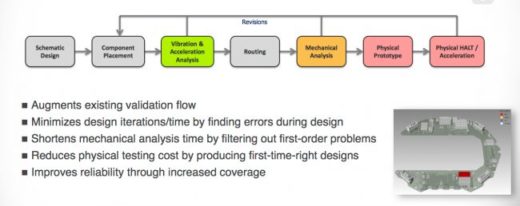Article Roundup: SRAM Redundancy, PCB Design, Electric Vehicles, Human vs. Compiler, and Artificial Intelligence
- Mentor’s Xpedition virtualizes simulation for ruggedized, safety-critical designs
- Calibre Can Calculate Chip Yields Correlated to Compromised SRAM Cells
- What the Chevy Bolt Really Means For the Electric Vehicle Market
- Give Me a Human Programmer over an Automated Compiler
- Artificial Intelligence and Engineering
Mentor’s Xpedition Virtualizes Simulation for Ruggedized, Safety-Critical Designs
Tech Design Forum
 PCB design for reliability (DFR) techniques for ruggedized, safety-critical designs is going virtual. The virtual simulation capabilities in Mentor’s Xpedition helps companies catch problems earlier to improve quality, while saving time and cost by reducing physical tests. Read a summary of Xpedition’s Vibration and Acceleration Analysis feature in this article.
PCB design for reliability (DFR) techniques for ruggedized, safety-critical designs is going virtual. The virtual simulation capabilities in Mentor’s Xpedition helps companies catch problems earlier to improve quality, while saving time and cost by reducing physical tests. Read a summary of Xpedition’s Vibration and Acceleration Analysis feature in this article.
Calibre Can Calculate Chip Yields Correlated to Compromised SRAM Cells
SemiWiki
![]() How much SRAM redundancy should be provisioned on an SoC design? Calibre YieldAnalyzer critical area analysis can help you determine the optimal redundancy level. It starts by taking the defect density information for each layer to calculate the average number of failures, and eventually performs what-if analysis to zero in on the optimal amount of repair resources.
How much SRAM redundancy should be provisioned on an SoC design? Calibre YieldAnalyzer critical area analysis can help you determine the optimal redundancy level. It starts by taking the defect density information for each layer to calculate the average number of failures, and eventually performs what-if analysis to zero in on the optimal amount of repair resources.
What the Chevy Bolt Really Means For the Electric Vehicle Market
Semiconductor Engineering
 For electric vehicles (EVs), it’s no longer a question of whether they’ll enter the mainstream, but rather how rapidly they’ll be adopted in global markets. Brian Derrick, VP at Mentor, a Siemens Business, examines who has the upper hand in the EV market – startups or established companies?
For electric vehicles (EVs), it’s no longer a question of whether they’ll enter the mainstream, but rather how rapidly they’ll be adopted in global markets. Brian Derrick, VP at Mentor, a Siemens Business, examines who has the upper hand in the EV market – startups or established companies?
Give Me a Human Programmer over an Automated Compiler
Embedded Computing Design
 When writing embedded code, does it make more sense to use a human programmer, or an automated compiler? A human programmer wouldn’t want to completely rewrite any code just because some small aspect of the requirements changed, but a compiler doesn’t care. Colin Walls walks readers through an example of this scenario using a switch statement.
When writing embedded code, does it make more sense to use a human programmer, or an automated compiler? A human programmer wouldn’t want to completely rewrite any code just because some small aspect of the requirements changed, but a compiler doesn’t care. Colin Walls walks readers through an example of this scenario using a switch statement.
Artificial Intelligence and Engineering
Engineering.com
 Artificial Intelligence (AI) has waxed and waned in the public eye since its conception in 1956. Today, AI is once again in the spotlight with machine learning emerging as one of the most fruitful avenues of AI research. This article discusses the profound impact AI will have across engineering including autonomous vehicles, data structuring, image processing, and more.
Artificial Intelligence (AI) has waxed and waned in the public eye since its conception in 1956. Today, AI is once again in the spotlight with machine learning emerging as one of the most fruitful avenues of AI research. This article discusses the profound impact AI will have across engineering including autonomous vehicles, data structuring, image processing, and more.